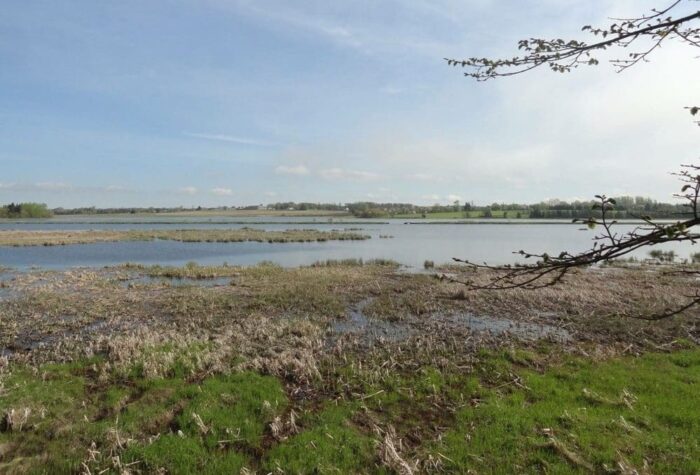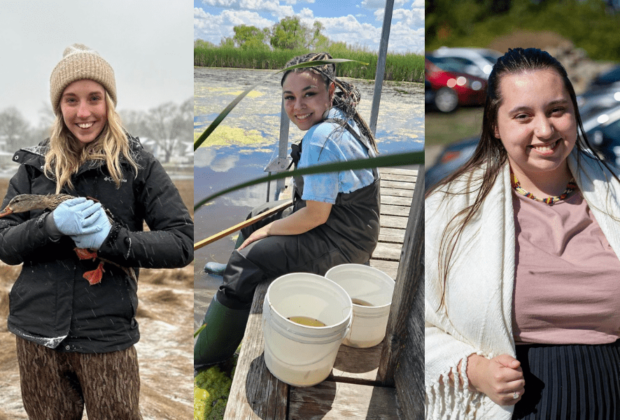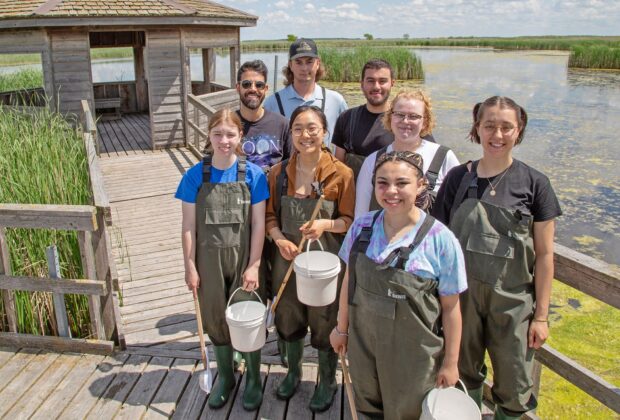Join us in congratulating our new Youth Wetland Experts! Last month, Zoë, Yuvika and Sydney from the Luther Marsh Wetland Centre of Excellence (WCE) in Mount Forest, Ont. won DUC’s national Wetland Centres of Excellence case study competition, earning the top spot among finalists from five schools across Canada.
The annual case study competition challenges Wetland Centres of Excellence students to tackle real conservation problems faced by DUC in the field. They have two weeks to complete their research before presenting to a panel of judges. This year DUC biologist and conservation programs specialist Jacob Demers and research scientist James Patterson were on the panel.
For the competition, the team from the Luther Marsh WCE chose to examine salt marshes and sea-level rise in Atlantic Canada. Their key question was: To adapt to sea-level rise in Atlantic Canada, will you choose to restore salt marshes, improve dikes, or both?
“I was really excited,” says Yuvika. “I’d learned a bit about sea-level rise in school and this was an opportunity to learn even more.”
Deciding on a solution for sea-level rise
The team got to work researching sea-level rise, salt marshes, dikes, and the pros and cons of each. They expected to arrive at an easy answer, but they learned there wasn’t one.
Both dikes and salt marshes help protect against sea-level rise. Dikes act as a physical wall, whereas salt marshes help by lowering the amplitude and speed of ocean waves and shielding the coastline from erosion.
“We spent a lot of time debating both sides,” says Sydney. “Zoë kept saying we should focus on salt marsh restoration, but to me dike maintenance made the most sense.”
They looked at pricing, ecosystem benefits and long-term maintenance, but they still couldn’t decide on a solution. It seemed that a one-size-fits-all approach wouldn’t work after all.
“The deciding factor was geography,” says Zoë. “Where there were coastal cities being protected by dikes, we kept the dikes in place to protect them from flooding. For other areas, we looked at salt marsh restoration as a solution.”

Overcoming obstacles
Working through the competition was no easy feat. They suffered one setback after another, starting when one of their team members contracted COVID and had to stay home to recover.
A few days later, nerves started to set in. A team member recalled presentations where her voice would speed up and shake, another where she’d cried on the spot.
On competition day, another setback. They’d found a problem in their presentation and had to scramble to make last-minute changes to the script.
“So, a few things went wrong along the way,” says Sydney, laughing. “But we pushed through. We really wanted to prove to ourselves that we could do it.”
Emerging victorious
Despite the setbacks, the team came out strong on competition day. They delivered a compelling presentation and impressed the judges with their thoughtful solution.
“It was clear from the very beginning that they’d done their research,” says Demers. “They looked carefully at the pros and cons, weighing all the options and coming up with a practical solution.”
When the team learned about their victory, they were shocked and excited. Realizing how far they’d come, and how their hard work had paid off, they felt incredibly proud.
“When I found out, I was in shock,” says Yuvika. “It didn’t feel real until I told my friends and family and heard them congratulating me. It was so crazy, but amazing, too.”
“I’m really proud of us,” says Sydney. “We did it. Despite all the setbacks and all our nerves, we got through it, together.”
DUC is proud of Zoë, Sydney and Yuvika for arriving at a strong, practical solution to sea–level rise. Conserving salt marshes is a great natural solution to climate change, and our engineers in B.C. and Atlantic Canada work hard to conserve them.
To learn more about how our conservation work helps fight sea–level rise, check out: https://www.ducks.ca/sea-level-rise/.





